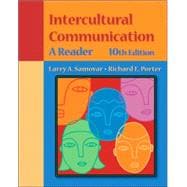
Note: Supplemental materials are not guaranteed with Rental or Used book purchases.
Purchase Benefits
What is included with this book?
| Part One: INTERCULTURAL COMMUNICATION: AN INTRODUCTION | |
| 1. Approches to Understanding Intercultural Communication | |
| Larry A | |
| Samovar and Richard E | |
| Porter, Understanding Intercultural Communication: An Introduction and Overview | |
| Harry C | |
| Triandi, Culture and Conflict | |
| Santoshi Ishii, Donald Cooke and Donald Klopf, Our Locus in the Universe: World View and Intercultural Communication | |
| Rod Janzen, Five Paradigms of Ethnic Relations | |
| Part Two: SOCIOCULTURAL BACKGROUNDS: WHAT WE BRING TO INTERCULTURAL COMMUNICATION | |
| 2. International Cultures: Understanding Diversity | |
| Wenshan Jia, The Chinese Conceptualizations of Face: Emotions, Communication, and Personhood | |
| James H | |
| Robinson, Communication in Korea: Playing Things by Eye | |
| Martin J | |
| Gannon, India: The Dance of Shiva | |
| Shirley van der Veur, Africa: Cultural Patterns and Communication | |
| Polly A | |
| Begley, Communication with Egyptians | |
| Robert Friday, Contrasts in Discussion Behaviors of German and American Managers | |
| 3. Co-Cultures: Living in Two Cultures | |
| Young Yun Kim, Unum and Pluribus: Ideological Underpinnings of Interethnic Communication in the United States | |
| Ronald L | |
| Jackson, II and Celnisha L | |
| Dangerfield, Defining Black Masculinity as Cultural Property: Toward an Identity Negotiation Paradigm | |
| Micheal Tinusta Garrett and Michael P | |
| Wilbur, Does the Worm Live in the Ground: Reflections on Native American Spirituality | |
| Michael Bronski, Gay Culture | |
| Julia T | |
| Wood and Nina M | |
| Reich, Gendered Speech Communities | |
| Valerie C | |
| Mckay, Communication Dynamics of the Elderly | |
| Dawn O | |
| Braithwaite and Charles A | |
| Braithwaite, "Which is my Good Leg?": Cultural Communication Patterns of People with Disabilities | |
| Part Three: INTERCULTURAL INTERACTION: TAKING PART IN INTERCULTURAL COMMUNICATION | |
| 4. Verbal Processes: Speaking Across Cultures | |
| Fern L | |
| Johnson, Cultural Dimensions of Discourse | |
| Mary Fong, The Nexus of Language, Communication and Culture | |
| Mei Zhong, Contemporary Social and Political Movements and their Imprints on the Chinese Language | |
| Aaron Castelan Cargile, Discriminating Attitudes Toward Speech | |
| Donald G | |
| Ellis and Ifat Moaz, Dialogue and Cultural Communication Codes Between Isrealite-Jews and Palestinians | |
| Carolyn Roy, Mexican Dichos: Lessons Through Language | |
| 5. Nonverbal Communication: Action, Sound and Silence | |
| Peter Andersen, In Different Dimensions: Nonverbal Communication and Culture | |
| Edwin R | |
| McDaniel, Japanese Nonverbal Communication: A Reflection of Cultural Themes | |
| Edward T | |
| Hall, Monochronic and Polychronic Time | |
| Deborah Borisoff and Lisa Merrill, Gender and Nonverbal Communication | |
| 6. Cultural Contexts: The Influence of the Setting | |
| Steve Quasha and Edwin R | |
| McDaniel | |
| Reinterpreting Japanese Business Communication in the Information Age | |
| Sheryl Lindsley and Charles A | |
| Braithwaite, U | |
| Americans and Mexicans Working Together: Five Core Concepts | |
| Jeanne M | |
| Brett, Culture and Negotiation | |
| Nagesh Rao, "Half-truths" in Argentina, Brazil and India: An Intercultural Analysis of Physician-Patient Communication | |
| Geneva Gay, Culture and Communication in the Classroom | |
| Part Four: INTERCULTURAL COMMUNICATION: SEEKING IMPROVEMENT | |
| 7. Communicating Interculturally: Becoming Competent | |
| Guo-Ming Chen and William J | |
| Starosta, Intercultural Awareness | |
| James R | |
| Baldwin and Michael Hecht, Unpacking Group-Based Intolerance: A Holographic Look at Identity and Intolerance | |
| Anita S | |
| Mak, Marvin J | |
| Westwood, F | |
| Ishi Ishiyama, and Michelle C | |
| Barker, Optimizing Conditions for Learning Sociocultural Competencies for Success | |
| Stella Ting-Toomey, Managing Intercultural Conflicts Effectively | |
| James Manseau Sauceda, Effective Strategies for Mediating Co-Cultural Conflict | |
| Mary Jane Collier, Understanding Cultural Identities in Intercultural Communication: A Ten Step Inventory | |
| Polly Begley, Sojourner Adaptation | |
| 8. Ethical Considerations: Prospects for the Future | |
| Index | |
| Harlen Cleveland, The Limits of Cultural Diversity | |
| Young Yun Kim, Intercultural Personhood: An Integration of Eastern and Western Perspectives | |
| Robert Shuter, Ethics and Communication: An Intercultural Perspective | |
| Martha Nussbuam, Citizens of the World | |
| David W | |
| Kale, Peace as an Ethic for Intercultural Communication |
The New copy of this book will include any supplemental materials advertised. Please check the title of the book to determine if it should include any access cards, study guides, lab manuals, CDs, etc.
The Used, Rental and eBook copies of this book are not guaranteed to include any supplemental materials. Typically, only the book itself is included. This is true even if the title states it includes any access cards, study guides, lab manuals, CDs, etc.